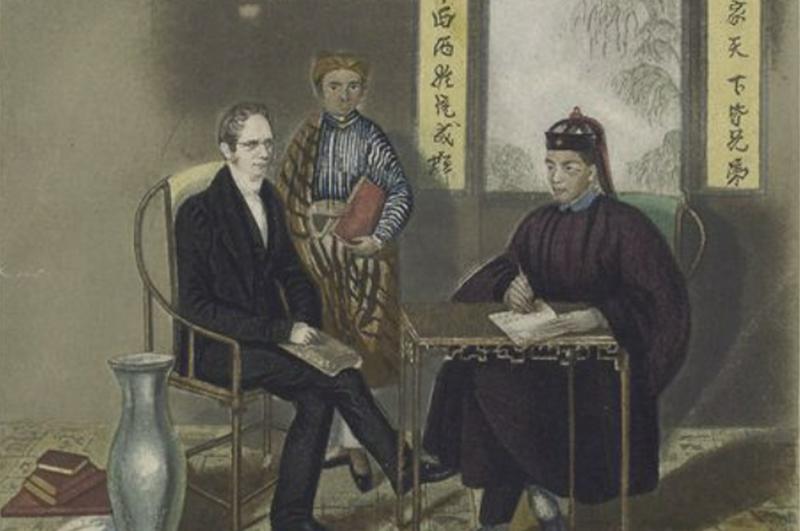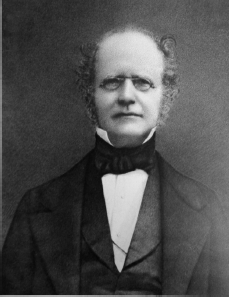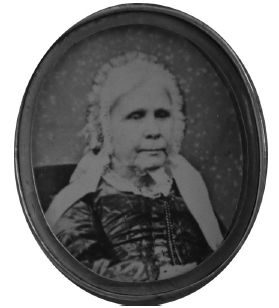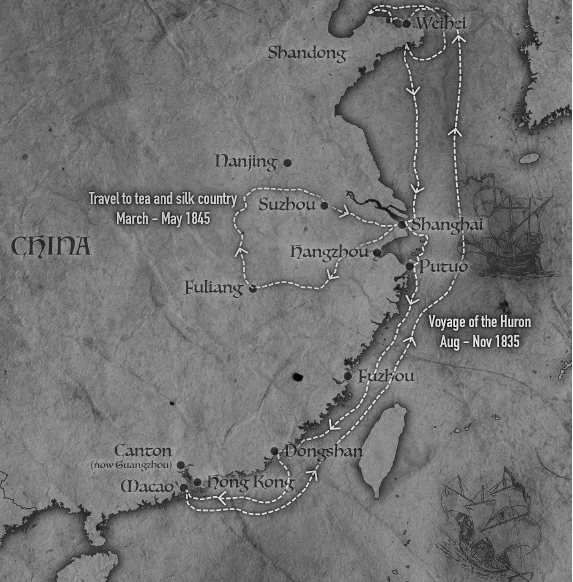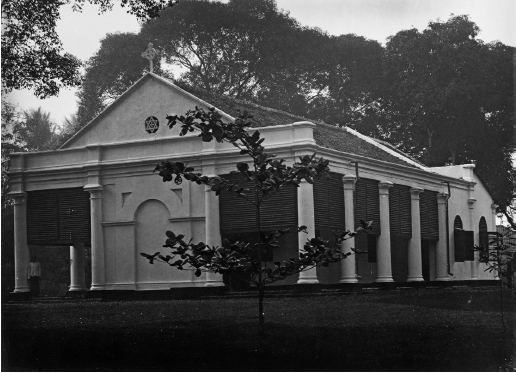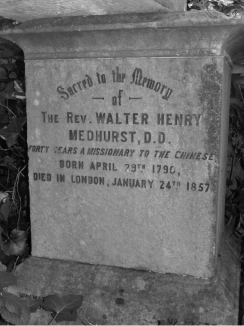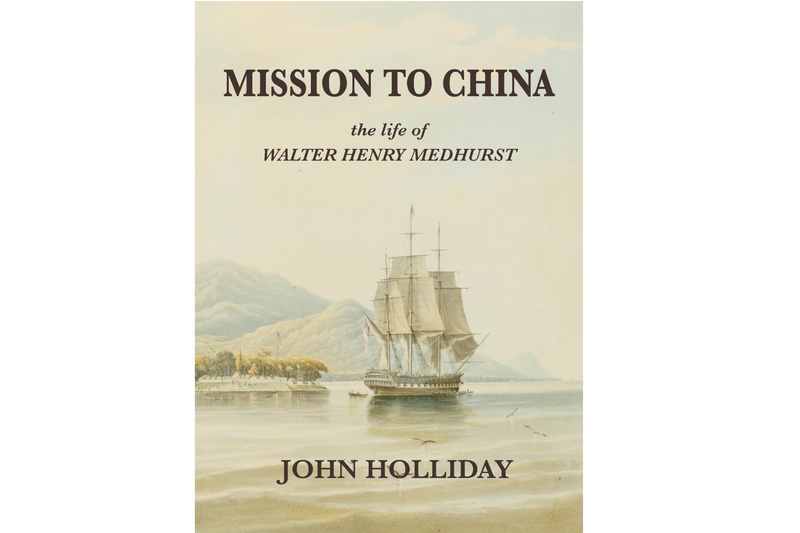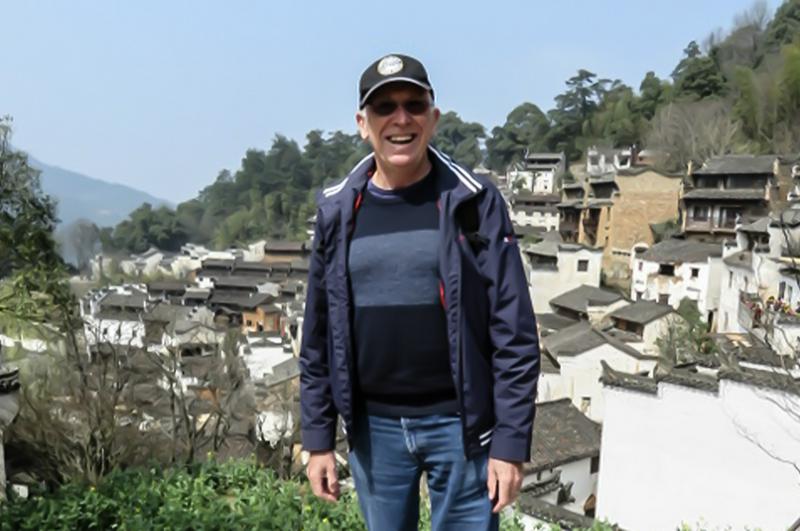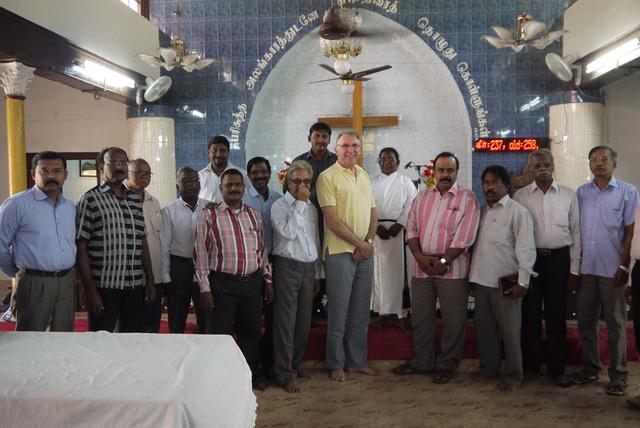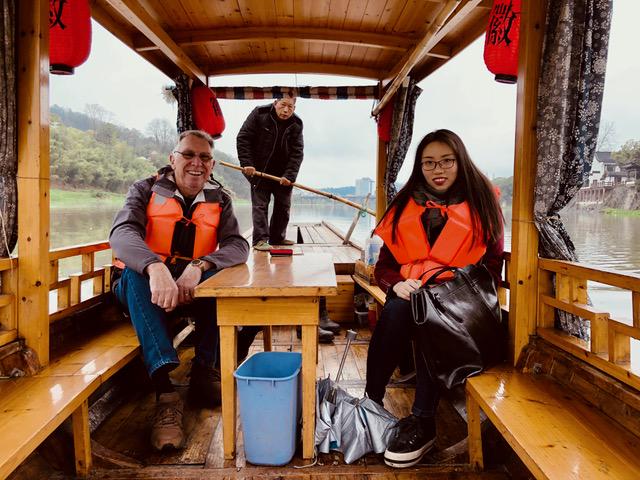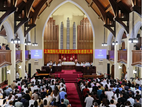Editor's note: Walter Henry Medhurst (1796-1857), a British missionary to China, was well known for his far-reaching contributions to China in the 19th century. Among his achievements in education, printing, and translation, notably was the famous Delegates' Version of the Chinese Bible, a literary and classic Chinese Bible translation which he led a group of missionaries to produce and was widely used in China for more than 70 years.
Deemed as one of the most important London Missionary Society (LMS) missionaries to China since Robert Morrison and William Milne, Walter Medhurst began his missionary work in Asia in 1816, and after almost 20 years in Southeast Asia, he was eventually allowed to China in 1843 and relocated to Shanghai. Walter established the LMS's mission center in Shanghai, the Shanghai Mission Press, which printed Bibles, gospel pamphlets, and reference works that introduced western natural sciences into China, and co-funded the first Western hospital in Shanghai. With excellent linguistic skills, he mastered Chinese and Malay, made a Chinese-English dictionary, and wrote numerous books about China, including China: Its State and Prospects.
John Holliday, the great-grandson of Walter Henry Medhurst, wrote a biography titled Mission to China: The Life of Walter Henry Medhurst to recount the 40 years of the ancestral missionary's traveling and engaging with the Chinese communities across Asia. The Daily Telegraph writes, "This book details the life and achievements of a little known figure in history whose impact on the modern world is still being felt." In an exclusive interview with China Christian Daily, Holliday shared about his book and Medhurst's mission work in China and the Chinese diaspora.
China Christian Daily: Could you please introduce yourself and this book?
John Holliday: Born in England, just outside of London, I have lived in Queensland, Australia, for about 40 years. When I was two years old, my father died, so my mother, brother, and I moved in with my maternal grandfather, Jonathan Bates Jr., son of Augusta, who was the daughter of Walter and Betty Medhurst. During those years, I often heard stories about Walter Medhurst. Our home had several items of Chinese origin, and I recall playing with a wooden pagoda featuring tiny people made of ivory.
Then I began writing during my retirement, starting with a memoir of my business life, which covered my operations in England, Canada, and Australia. I enjoyed that project so much that I wanted to write a biography of someone else, who had achieved far greater things than I had in my business life. My interest turned to Walter Medhurst.
China Christian Daily: What initially inspired you to write a biography about Walter Medhurst and his missionary work in China?
John Holliday: [Before coming to China,] Walter Medhurst had lived for 20 years among the Chinese diaspora. The All Saints Jakarta, the oldest English-speaking institution, originally built by Medhurst, is now operating, and so is the Parapattan Orphanage, which Medhurst founded in 1832. I have had the pleasure of assisting Parapattan in building a library, which they have named the Medhurst Library. This evidence of his achievements indicates that a biography of his life must already exist, and I decided that this should be my mission.
China Christian Daily: Walter Medhurst spent decades in Southeast Asia before finally reaching China. What drove his unwavering commitment to reach the Chinese people with the gospel? According to the book, the London Missionary Society initially would like to hire a printer for Malacca, but he was determined to become a missionary to China.
John Holliday: Born in London in 1796, Walter Medhurst spent his formative years in Gloucester, where his father ran a public house. His initial education was held at the prestigious St Paul's School in London, but in 1810, his education came to an end due to financial problems. His mother was able to persuade the Editor of the Gloucester Herald to take Walter on as a printing apprentice.
Walter became known in Gloucester as an interesting youth without the fear of God; he was fond of the theatre and dancing, and was the life of the parties he attended, hardly the behavior expected of a potential missionary. It was Walter's older brother William who was responsible for Walter's change of heart. He persuaded Walter to attend the Independent Chapel in Gloucester to hear the Reverend William Bishop preach. The Rev. Bishop's influence was as much attributable to Walter's character and his propensity to make a commitment to something once he had made up his mind.
The late eighteenth and early nineteenth centuries had seen the emergence of the evangelical movement led by early leaders like John and Charles Wesley, George Whitfield, and many others. As a diverse group, some of evangelical Christians were at the forefront of movements such as the abolition of slavery, prison reform, orphanage establishment, hospital building, and the founding of educational institutions, while there were reaching out to the world through organizations like the London Missionary Society, which sent missionaries to the far corners of the earth.
In October 1812, Walter attended a meeting in Bristol, convened by the LMS, to establish a group to support the organization. According to his daughter, it was then that Walter "became fired with zeal to become a missionary and go to China whenever an opportunity occurred."
Early in 1816, the LMS required a printer to join the mission in Malacca, where it had established a center to prepare missionaries for the time when China opened its borders to foreigners. No doubt the LMS saw in Walter the makings of a missionary, but there was no time for him to study and become ordained; a printer was needed urgently. So, on August 30, 1816, Walter left London, bound initially for Madras, where he could arrange another ship to Malacca.
Twenty-six years would pass before foreigners would be allowed to enter China. During that time, Walter was ordained in Malacca by Dr William Milne, after which he undertook a mission to Penang before being requested to take over the new mission in Batavia (now Jakarta).
China Christian Daily: Walter's linguistic ability was remarkable—he mastered several Chinese dialects and translated major Christian texts. How important was language in his missionary strategy, and what impact did his translation work have?
John Holliday: Walter arrived in Madras at the beginning of the monsoon season, causing him to wait three months for onward passage to Malacca. He wrote to inform London that he had obtained a Chinese book of grammar from Calcutta and commenced studies. Such was his enthusiasm that he had spent time on the ship teaching himself Hebrew and was able to read a great part of the Book of Genesis.
His love of languages might have been a factor in his attraction to a young widow who was living at the Madras mission at the time. Betty Braune was a widow whose father was English and her mother was a native Indian. In the short period of Walter's stay in Madras, a love affair developed, and on May 19, 1817, Walter and Betty were married in the mission chapel. On the next day, the Medhursts and Betty's son, George, set sail for Malacca. Betty's multilingual background—she spoke Tamil, Telugu, Malay, Chinese, and English—allowed her to engage deeply with local communities. Wherever they went, Betty was a full participant in the mission's success.
China Christian Daily: Walter played a leading role in establishing the Shanghai Mission and nurturing it over time. There were once the famous "Medhurst Apartments" in Shanghai.
John Holliday: The Medhursts spent almost 20 years in Batavia, now Jakarta, and the LMS took advantage of Walter's success by sending new missionaries to spend some time with him. He established the church, which now operates as All Saints Jakarta and the Parapattan Orphanage. The couple had 10 children, but sadly, only five lived into adulthood. The Medhursts returned to England in 1838 and undertook a speaking tour for the LMS, and he published his book, China, Its State and Prospects. He returned to Batavia with his son, Walter Jr., who had been sent back to England to be educated. He also came back with Dr William Lockhart, whom he had recruited to be able to set up a medical clinic at the next mission center. Walter's son and Dr Lockhart continued on to Macao to study Chinese.
Following the First Opium War and the Treaty of Nanking, five ports were opened to foreigners in China. With the passing of Dr Robert Morrison and Dr William Milne, Medhurst became the senior missionary among the LMS, and he chose to establish a mission in Shanghai, along with his new recruit and friend, Dr Lockhart. By this time, Walter Jr. had been appointed as the consular interpreter to the Shanghai British Consul, who was able to assist in finding a location for the mission center just outside the old city walls.
One of Walter Medhurst's greatest talents was his ability to communicate well, both verbally and in the written word, through his printing. He had a way of communicating his ideas without raising the ire of his listeners, often resulting in him learning as much, or more, about Taoist and Confucian beliefs as the Chinese learned about Christianity. Although he did not claim any conversions from these activities, he distributed books and pamphlets, which the recipient retained and read. He was bringing messages to the Chinese, but he was also communicating information about the Chinese back to England and America. The University of New York recognized this by awarding Walter Medhurst with a Doctor of Divinity.
Walter laid the foundations for significant success in the future. The Chinese Delegates Translation Bible was widely used by most of the Protestant churches from 1853 until the publication of the Union Bible in 1919. The City of Shanghai is now one of the largest cities in the world, and its modern city center originated from the international settlement, of which Walter was one of its first councillors. The Chinese hospital that he and William Lockhart started went on to become the Renji Hospital, one of the largest hospitals in China. The printing works of the Shanghai Mission Press were the first time that typography was used in China. The introduction of the first font of Chinese type proved to be an important factor in transforming Chinese society.
His missionary work was augmented by other factors resulting from being raised in the time known as The Age of Enlightenment. This meant that he placed emphasis on combining other messages with his preaching, including ways in which to improve human life with better health care, education, and the observance of human rights. Looking at all those things, I think that Walter had made a difference.
China Christian Daily: How did Walter's mission influence other Protestant missionaries who came after him, particularly in the early days of the Shanghai missionary community?
John Holliday: The Shanghai mission center became a very important place for LMS and for other organizations, such as the American Board of Commissioners for Foreign Missions. During his last year in China, a young British man arrived from England, and although he was not sent out on behalf of the LMS, he initially lived at the mission center. That man was James Hudson Taylor. He went on to a fifty-one-year career as a missionary to China and took over the organization created by Charles Gutzlaff, turning it into the China Inland Mission.
China Christian Daily: As you mentioned in this book, Medhurst had a long association with John Morrison, son of Dr Robert Morrison, who was the first Protestant missionary to China. By coincidence, he almost died 50 years after the death of Dr Morrison. Could you share more about it?
John Holliday: John Morrison was born in Macao and succeeded his father as the Chinese secretary to the British East India Company and as the translator of the Bible. He also collaborated with Walter Medhurst and Karl Gutzlaff on their first translation of the Bible into Chinese. He died in Hong Kong in 1843, aged 29.
Walter Medhurst had a longer relationship with the son of Dr William Milne, also named William, whom Betty had taken care of as a four-year-old when his mother Rachel Milne died in Malacca. Consequently, when Milne arrived in Hong Kong in 1843, as a new LMS missionary, he was reunited with the Medhursts as if it were almost a family reunion. Walter and William left Hong Kong together, Walter heading to Shanghai and William to Ningbo. A huge storm hit their ship, dismasting it, and the vessel eventually limped into Manila, from where Walter managed to get a Dutch ship to give him passage back to Hong Kong. Later on, William Milne would become one of the delegates working with Walter in Shanghai on the translation of what was to become the Delegates' Version.
China Christian Daily: Can you share insights about the role of Medhurst's wife, Betty, in the mission, particularly how she supported or influenced the publishing and educational work?
John Holliday: Having been born and raised in Asia, she was at ease meeting people from different cultural backgrounds, and her own experiences inspired her to help others wherever she could. Just like Walter, she was a talented linguist and we know that she could converse in Malay and Chinese as well as her native English and two Indian languages. Betty was often involved in running the schools that the LMS set up at each mission location.
In addition, she gave birth to 10 babies, although due to the conditions in which they had to live, only five survived into adulthood.
China Christian Daily: What do you want us to remember about him?
John Holliday: It was interesting for me during the research to go to the places where he'd been. I hired a Chinese graduate student to help me find the places where he disguised as a Chinese man on a two-month expedition into interior China when foreign people were only allowed into five trading ports. He went by boat or by foot, and rarely on horseback, to learn about people and China, which he was totally interested in.
Now I find it exciting to go and walk to some of those same places. I happened to visit the church in Chennai, India, where Walter and Betty got married in 1817 on a Sunday, and there was a full congregation. The priest of the Anglican church invited me to the front, which was emotional to be there and to realize that the church was so vibrant. The people were friendly and I had a lovely time visiting them. I've been to the church in Jakarta recently because the old mission house is being restored as the Midhurst House, where many missionaries passed through and stayed prior to going on to China, when the treaty ports were opened up.
China Christian Daily: What do you think Walter would say to us if he were alive today?
John Holliday: The world has changed so much, so it would be hard to recognize the growth that's been obtained. But I think he would be proud of the fact that Christianity is strong and living on in China today.
China Christian Daily: Could you share with us the situation of the Medhurst after his death, and even the situation of the family?
John Holliday: Walter Medhurst left Shanghai for the last time on 12 September 1856 and arrived in England on 21 January 1857. He was extremely unwell at this time, and after reaching London, he passed away on 24 January 1857.
Walter had never placed any emphasis on financial security for his family, and it appeared that LMS required some prompting to provide security for his widow and his daughter Augusta. A letter from the Bishop of Victoria (Hong Kong), which was reprinted in the British newspapers, urged the LMS to provide some security for Betty and Augusta. This prompted LMS to provide some small level of support and encouraged several other Christian societies to assist as well. A number of friends who managed trading companies in China also came forward with some financial help. The 1861 census shows Betty and Augusta living with one of their older children, who had returned to England. Betty died in Devon in 1874.
Augusta went on to marry the Reverend Jonathan Bates, who was the vicar of a church in Norfolk. They had two children, Jonathan and Violet, Jonathan being my grandfather, with whom I lived as a child. Sadly, his father, the Rev. Jonathan Bates, died before his children were three. Augusta did not remarry and eventually lived with her son Jonathan, and she died there in 1926.
China Christian Daily: Have you ever been to China?
John Holliday: I've been to Shanghai two or three times and Jingdezhen, a famous place for Chinese pottery. Shanghai is a huge city now, and it's hard to imagine the way it was when Walter and Betty stayed there. But the layout is still there from the days when I was writing. You could tell from the same street layout where the mission center was.
China Christian Daily: Do you have any words for Christians in China?
John Holliday: I was raised in an Anglican family, and as children we attended the Church of England. I met and married my wife, Colleen, in Canada, and she was raised as a Roman Catholic. We were married in the Uniting Church of Australia, a merger of the Methodist, Presbyterian, and Congregational Churches in Australia. So we have experience covering many denominations of Christianity. My hope for Christians in China is that you are as free to select the way in which you worship as I have been able to wherever I have lived. God bless you.
The interview has been edited for clarity and concision.

